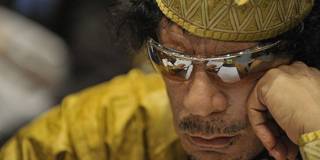The recent coup attempt in Libya has finally pierced the illusion that the dysfunctional central government can rule effectively. It also confronts the country's leaders – and their Western benefactors – with the need to consider the legacy of Muammar el-Qaddafi’s four decades in power.
ANTALYA – The recent coup attempt in Libya, led by General Khalifa Hiftar, has finally pierced the illusion that the country’s dysfunctional central government, whose power is limited to the capital, Tripoli, can rule effectively. But determining how to bring peace and stability to Libya’s deeply fragmented society will require more than an assessment of this government’s mistakes; it will demand careful consideration of former leader Colonel Muammar el-Qaddafi’s failures – and his successes.
Hiftar believes that the key to solving Libya’s myriad crises lies in establishing a strong national army capable of subduing the Islamists who are destabilizing the country. Others continue to advocate for national reconciliation. But neither solution addresses what is really driving events in Libya: the legacy of Qaddafism.
Given that Qaddafi ruled Libya for more than four decades, his is a legacy that cannot simply be ignored. That means not only recognizing the vital link between his policies and today’s problems, but also ensuring that what should be preserved is not sacrificed in the rush to efface his memory.

ANTALYA – The recent coup attempt in Libya, led by General Khalifa Hiftar, has finally pierced the illusion that the country’s dysfunctional central government, whose power is limited to the capital, Tripoli, can rule effectively. But determining how to bring peace and stability to Libya’s deeply fragmented society will require more than an assessment of this government’s mistakes; it will demand careful consideration of former leader Colonel Muammar el-Qaddafi’s failures – and his successes.
Hiftar believes that the key to solving Libya’s myriad crises lies in establishing a strong national army capable of subduing the Islamists who are destabilizing the country. Others continue to advocate for national reconciliation. But neither solution addresses what is really driving events in Libya: the legacy of Qaddafism.
Given that Qaddafi ruled Libya for more than four decades, his is a legacy that cannot simply be ignored. That means not only recognizing the vital link between his policies and today’s problems, but also ensuring that what should be preserved is not sacrificed in the rush to efface his memory.